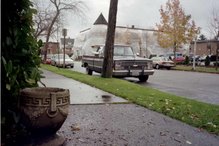I saw ALASKA FAR AWAY: THE NEW DEAL PIONEERS OF THE MATANUSKA COLONY at the Swedish Cultural Center in Seattle on Sunday afternoon. For a time in 1940 and 1941 my father was with the United States Army Corps of Engineers in Alaska. He visited Palmer, Alaska, for the Matanuska Valley Fair. The autumn of 1941 he returned to Seattle. When the Pearl Harbor attack occurred, he was working as a pharmacist at a drugstore. Before the discussion, during the social hour, I was able to share photographs my father took at Palmer, Alaska, in 1941 with Dr. Alanen and others at the Swedish Cultural Center.
The film followed a short discussion by Arnold Alanen, professor emeritus of University of Wisconsin, about a book he did about Swedish-Finnish structures and architectural preservation. Professor Alanen was featured in the film in an interview.
The trailer for ALASKA FAR AWAY: "The Matanuska Colonization Project of 1935 was among the most unusual and controversial of the many New Deal programs designed to help ordinary citizens crushed by the Great Depression. ALASKA FAR AWAY: THE NEW DEAL PIONEERS OF THE MATANUSKA COLONY tells the story of this bold government experiment, and the families who found themselves thrust into the national spotlight along the way."
After the movie we learned that one family member featured in the film was with us in the audience. A person said to me, ten percent of the colonists to Alaska were Finns. They were recruited from the Northern Border with Canada, in Michigan and Wisconsin, areas with Finnish immigrant centers and hard -hit during the depression.
The movie tells of government recruitment, the journey to Alaska, tent cities in the Matanuska Valley in midnight sun, the first snowfall, and the retreat of some colonists and a search for new recruits, among other historic points. I was left with the impression that the movie was paced well to carry the attention of the audience.
The film shows soldiers working at Alaska farms while stationed nearby during World War Two.
The Swedish-Finnish Historical Society presented crackers, cookies, coffee bread and coffee to the audience. Dr. Alanen was celebrating his book about Midwest structures, but beginning research on Pacific Northwest Swedish-Finnish structures. The Swedish Finnish Historical Society had sent out a call to people who knew of historic structures.


No comments:
Post a Comment